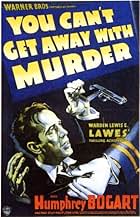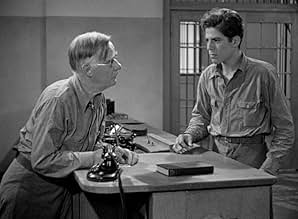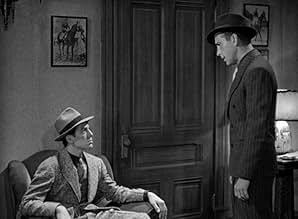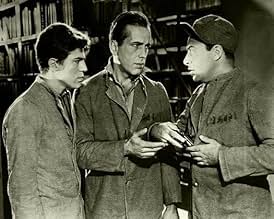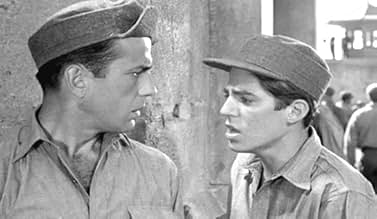IMDb RATING
6.3/10
1.4K
YOUR RATING
Youthful tough Johnnie Stone has fallen under the influence of petty crook Frank Wilson, who involves him and robbery and murder using his sister's boyfriend's stolen gun.Youthful tough Johnnie Stone has fallen under the influence of petty crook Frank Wilson, who involves him and robbery and murder using his sister's boyfriend's stolen gun.Youthful tough Johnnie Stone has fallen under the influence of petty crook Frank Wilson, who involves him and robbery and murder using his sister's boyfriend's stolen gun.
Joe King
- Principal Keeper
- (as Joseph King)
Eddie 'Rochester' Anderson
- Sam
- (uncredited)
Sidney Bracey
- Tourist on Boat
- (uncredited)
Edwin Brian
- Billiards Observer
- (uncredited)
Frankie Burke
- Billard Player
- (uncredited)
Featured reviews
Before superstardom Humphrey Bogart took many of these "mugg" parts before exploding on the scene in "High Sierra". In this film Bogart plays a small time hood named Frank Wilson whom is followed by Johnny {aka Leader of the Dead End Kids featured in other early Bogart movies}. Johnny is a teenager heading down the wrong path and gets into big trouble when Frank murders someone at a botched heist job. The real trouble for Johnny is that Frank frames the murder on someone near and dear to Johnny. The two hoods end up in prison after accepting charges on another crime to beat the murder rap. While at Sing Sing prison the guilt starts to get to Johnny and Frank doesn't like it. Will Bogie get away with murder? Not a classic movie by any stretch, but worth checking out, especially Bogart fans.
Don't come to this film expecting that much Bogart or that much action, and you'll probably enjoy this 80 minute-long late 30's crime drama.
Billy Halop of the Dead End Kids is the real star of this film, made two years before Bogart became a true star at Warner Brothers, but this time Halop is minus the other Dead Enders. Here he plays John Stone, a kid from Hell's Kitchen who idolizes small-time gangster Frank Wilson (Humphrey Bogart). John is troubled because it has always been himself and his sister alone against the world, and now big sister is seriously dating cop Fred Burke (Harvey Stephens). John feels replaced by Burke and also resents the guy trying to be a substitute big brother to him.
Frank and Johnny pull off one gas station robbery without a hitch, giving Johnny a taste for more, but the second robbery does not go so well, with Frank killing a pawn shop owner. The problem is that the gun left at the scene was stolen from Burke, is easily traced back to him, and soon Burke is sitting in the death house for a crime committed by Frank and Johnny. In the meantime, Frank and Johnny are picked up and sent to prison for a short stretch (3 years) for their first robbery. In spite of his rough exterior Johnny really has a conscience, and it's working on overdrive with Burke sitting in the same prison as Johnny, except Burke is awaiting execution, not parole. Time is counting down to both Burke's execution and the end of Johnny's sanity. Frank has no problem having someone else fry for his crime, but he can see Johnny is cracking up and he has to come up with some way to keep the kid quiet.
Henry Travers has a supporting yet significant part as the prison librarian - Pop - in a role that seems to be a warm-up for playing Clarence in "It's a Wonderful Life". He plays probably the only true father figure Johnny has ever had. Eddie Rochester Anderson of Jack Benny Show fame lightens the film just a bit as an inmate who comes to the library each day just to read cookbooks aloud.
As for Bogart, he's at his nastiest here without a shred of humanity. As Pop says, "He's the kind of guy who's so crooked if he tried to go straight he'd crack".
Billy Halop of the Dead End Kids is the real star of this film, made two years before Bogart became a true star at Warner Brothers, but this time Halop is minus the other Dead Enders. Here he plays John Stone, a kid from Hell's Kitchen who idolizes small-time gangster Frank Wilson (Humphrey Bogart). John is troubled because it has always been himself and his sister alone against the world, and now big sister is seriously dating cop Fred Burke (Harvey Stephens). John feels replaced by Burke and also resents the guy trying to be a substitute big brother to him.
Frank and Johnny pull off one gas station robbery without a hitch, giving Johnny a taste for more, but the second robbery does not go so well, with Frank killing a pawn shop owner. The problem is that the gun left at the scene was stolen from Burke, is easily traced back to him, and soon Burke is sitting in the death house for a crime committed by Frank and Johnny. In the meantime, Frank and Johnny are picked up and sent to prison for a short stretch (3 years) for their first robbery. In spite of his rough exterior Johnny really has a conscience, and it's working on overdrive with Burke sitting in the same prison as Johnny, except Burke is awaiting execution, not parole. Time is counting down to both Burke's execution and the end of Johnny's sanity. Frank has no problem having someone else fry for his crime, but he can see Johnny is cracking up and he has to come up with some way to keep the kid quiet.
Henry Travers has a supporting yet significant part as the prison librarian - Pop - in a role that seems to be a warm-up for playing Clarence in "It's a Wonderful Life". He plays probably the only true father figure Johnny has ever had. Eddie Rochester Anderson of Jack Benny Show fame lightens the film just a bit as an inmate who comes to the library each day just to read cookbooks aloud.
As for Bogart, he's at his nastiest here without a shred of humanity. As Pop says, "He's the kind of guy who's so crooked if he tried to go straight he'd crack".
One of those fun urban crime dramas that Warner Bros. excelled at in the 1930s. This one stars Humphrey Bogart as a crook who corrupts teenage street tough Billy Halop (sans the rest of the Dead End Kids) into committing armed robbery and framing Halop's sister's boyfriend for murder. Soon Bogie and Halop are arrested and sent to prison together while the boyfriend (dull Harvey Stephens) faces possible execution for a crime he didn't commit.
Bogart is fine in a role he could play in his sleep but he doesn't get as much to do as Halop, who WB clearly had high hopes for. Halop is alright when he's playing to his Dead End Kids persona but when he gets melodramatic, the result is over the top. Great character actors like Henry Travers, Harold Huber, John Litel, Joseph Crehan, and Joe Sawyer add color to the cast and liven things up. Travers is especially good. Lovely Gale Page plays Halop's sister and gives a sympathetic turn. It's not one of the better examples from this genre but I doubt many fans will complain about it or feel like it's time wasted.
Bogart is fine in a role he could play in his sleep but he doesn't get as much to do as Halop, who WB clearly had high hopes for. Halop is alright when he's playing to his Dead End Kids persona but when he gets melodramatic, the result is over the top. Great character actors like Henry Travers, Harold Huber, John Litel, Joseph Crehan, and Joe Sawyer add color to the cast and liven things up. Travers is especially good. Lovely Gale Page plays Halop's sister and gives a sympathetic turn. It's not one of the better examples from this genre but I doubt many fans will complain about it or feel like it's time wasted.
To say that Humphry Bogart paid his dues is an understatement. From the time he joined Warner Bros. until his breakthrough role in "High Sierra," he was the studio's most reliable scowling, snarling double-crossing hood. Here's he's a penny-ante crook who enlists Billy Halop to join him in a quick stick-up. The pair are quickly caught and packed off to prison where Halop has continual bouts of conscience and Bogart masterminds an escape. If that sounds familiar, the plot -- and variations on same -- were standard Warner Bros. fare, especially in the 1930s. Bogart manages to pack a lot of charisma into a stereotype and Halop's ex-Dead End performance is pretty good, as well. But the movie itself doesn't veer too far from an all-too-familiar formula.
You Can't Get Away with Murder (1939)
From the peak of classic pre-war Hollywood and "Gone with the Wind," anticipating the equally classic and more slick "Citizen Kane" and "Casablanca" in the next three years. And just before star Humphrey Bogart has his breakout in "The Maltese Falcon" in 1941. Things hang a little undecided here, a classic crime drama a removed from the early 30s Warner Bros. masterpieces, but unpolished for its time, too. Blame a modest budget.
But then again, this is rather good on its own terms, a standard gangster story with a message. And Bogart is strong, a bit more developed than his earlier gangster roles where he's a bit of stereotype. Bits of dry humor and disdain creep in, welcome Bogart touches. The main twist here is a sweet young man, really just a kid, gets involved. And how. Note the title.
The writing isn't always great, sometimes falling into cheap dramatic comments without surprise, or even avoiding basic believability. The action parts are good and well filmed (and they avoid unnecessary dialog). Some of the side characters are just filling roles without depth, or are clichés (the African-American reading the cookbook— charming and fun, or the good-hearted librarian in prison). Even the kid isn't quite right, as if he's playing what he thinks he should instead of inhabiting the role.
Bogart, however, is a whole different class of actor in all of this, and he's the reason to watch. The last twenty minutes click along really nicely. Not an awful film in all, but be prepared for some routine stuff between the highlights.
From the peak of classic pre-war Hollywood and "Gone with the Wind," anticipating the equally classic and more slick "Citizen Kane" and "Casablanca" in the next three years. And just before star Humphrey Bogart has his breakout in "The Maltese Falcon" in 1941. Things hang a little undecided here, a classic crime drama a removed from the early 30s Warner Bros. masterpieces, but unpolished for its time, too. Blame a modest budget.
But then again, this is rather good on its own terms, a standard gangster story with a message. And Bogart is strong, a bit more developed than his earlier gangster roles where he's a bit of stereotype. Bits of dry humor and disdain creep in, welcome Bogart touches. The main twist here is a sweet young man, really just a kid, gets involved. And how. Note the title.
The writing isn't always great, sometimes falling into cheap dramatic comments without surprise, or even avoiding basic believability. The action parts are good and well filmed (and they avoid unnecessary dialog). Some of the side characters are just filling roles without depth, or are clichés (the African-American reading the cookbook— charming and fun, or the good-hearted librarian in prison). Even the kid isn't quite right, as if he's playing what he thinks he should instead of inhabiting the role.
Bogart, however, is a whole different class of actor in all of this, and he's the reason to watch. The last twenty minutes click along really nicely. Not an awful film in all, but be prepared for some routine stuff between the highlights.
Did you know
- TriviaIn En surveillance spéciale (1939), Humphrey Bogart and Lee Patrick are seen leaving a theater showing this movie.
- GoofsWhen Frank returns to his apartment after the pawn shop robbery, a moving shadow of the boom microphone is briefly visible on the door frame above his head.
- Quotes
Frank Wilson: Maybe this'll help you out. There's only two guys know who did the shootin' and one of them's dead, and the other one's gonna be if he don't keep his trap shut...
[Pointedly]
Frank Wilson: Good night, Johnny!
- ConnectionsReferenced in En surveillance spéciale (1939)
- How long is You Can't Get Away with Murder?Powered by Alexa
Details
- Runtime1 hour 19 minutes
- Color
- Sound mix
- Aspect ratio
- 1.37 : 1
Contribute to this page
Suggest an edit or add missing content


